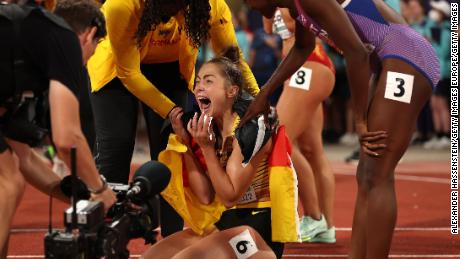The 27-year-old Italian finished with a time of 9.95 seconds, fractionally ahead of Team GB’s Zharnel Hughes who finished in 9.99 seconds and Hughes’ teammate, Jeremiah Azu, who finished in 10.13 seconds.
In doing so, Jacobs became just the third man in history to win 100m Olympic gold and European gold back-to-back — after Valreiy Borzov of the Soviet Union and Great Britian’s Linford Christie — having shocked the world at Tokyo 2020 when he stormed to victory.
The win also caps off an injury-riddled season, in which he’s had to pull out of competitions, having to deal with illness and muscle issues prior to Munich.
And after such a frustrating season, the victory is all the more satisfying for Jacobs.
“I’m very happy with this result. It wasn’t my best race from a technical point of view and the time is not what I wanted, but it mattered crossing the line first after an outdoor season so complicated and full of injuries,” Jacobs said after the race.
“Coming here and showing that I am the best is something beautiful that motivates me to push even harder.”
Before the season began, he had the aim of winning three medals. And with two out of three medals secured, having won the world indoor 60m title in Belgrade in March, Jacobs says the year as a whole can be considered a “good result.”
“Being forced to withdraw from the semifinals at the World championships was a big disappointment, but next year, there’s going to be another championships and all my motivation will be to do well there,” he said.
“I want to say thank you to the people who have been supporting me, and also to the people who criticized me because they gave me the energy to show that I’m the best.
“I’d like to watch it again as I think I ran better in the semifinal. Maybe, I was too tense and I didn’t start well, then I managed to recover speed, but it was important to finish ahead. When I was practicing at the starting blocks, I felt a niggle in my calf, but I tried to give it all, and fortunately, it was just a small problem.
“The time is not as great as what I wanted because I always aim for the best, but I’m happy with this. A lot of people thought that I wouldn’t even start and winning gold means that we have been working well and that I can continue to achieve great things. Now, I’m looking to win more with the 4×100.”
Home favorite
In the women’s 100m final, Gina Lückenkemper gave the predominately German crowd something to cheer.
The 25-year-old, who won silver at the 2018 European Championships, went one better on home soil, winning gold in front of her home fans.
In an extremely tight finish, Lückenkemper ran a season best time of 10.99 seconds to win gold, just five thousandths ahead of Switzerland’s Mujinga Kambundji in second with 10.99 (.989), with Great Britain’s Daryll Neita finishing third in a time of 11.00 seconds.
“I’m so incredibly grateful for you,” Lückenkemper exclaimed to the crowd after her win. “To stand in this cauldron today motivated me incredibly.”
Three-time defending European champion Dina Asher-Smith could only limp across the finish line in last position after complaining about cramps.
“I got cramps in both my calves, I’ve never cramped in my life during a race and it might have something to do with my hydration, so I’m going back and check with my team,” she said afterwards.



